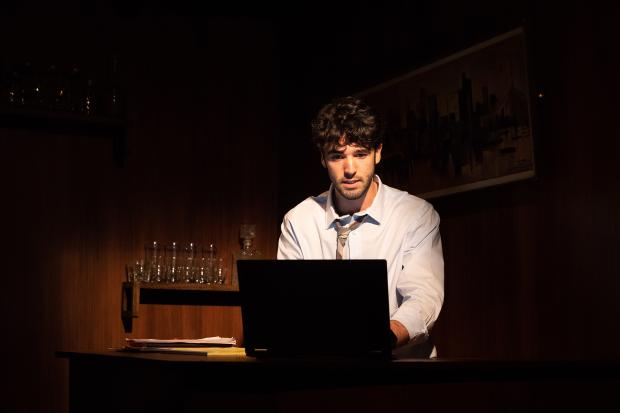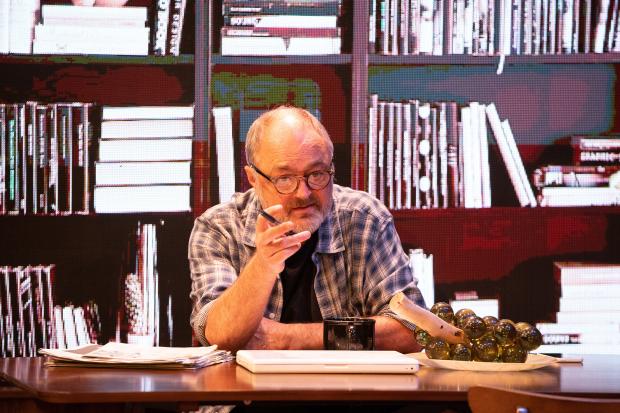We live in an uncertain age wherein the very essence of truth is not only being questioned, but is literally under assault. Not one but two screen versions of the classic fable Pinocchio were produced in 2022. Books, including history texts, are being hysterically banned in Florida and elsewhere. Fox “News” (now there’s an oxymoron!) is embroiled in a $1.6 billion defamation lawsuit, while its smug prig Fucker Carlson reportedly demanded the firing of a Fox staffer for fact-checking its 2020 election lies and telling the truth. Journalism has been decried as “fake news” – by a U.S. president who, in turn-around-fair-play, was accused of making “false or misleading claims” 30,573 times by The Washington Post’s fact checking team during Trump’s misbegotten presidency.
The notion of truth versus fiction is at the heart of The Lifespan of a Fact, which, ironically, is based on real-life events and a 2012 nonfiction book of the same name and is one of the few productions wherein a fact checker is a central character. The play, which dramatizes an essential theme that emerged during Trump’s hellish reign, opened on Broadway in 2018 while that mendacious madman was still in the White House, with an all-star cast: Daniel Radcliffe, Bobby Cannavale and Cherry Jones. Now, Los Angeles’ venerable yet cutting edge Fountain Theatre is premiering this hard-hitting, if witty, drama with the West Coast debut of this work co-written by Jeremy Kareken, David Murrell and Gordon Farrell.
In The Lifespan of a Fact, newly minted Harvard graduate Jim Fingal (Jonah Robinson) is a young intern for a major Manhattan-based magazine who is assigned by his no nonsense, in control editor Emily Penrose (Inger Tudor) to do a routine fact checking of an important piece about a suicide in Las Vegas by the prominent writer John D’Agata (Ron Bottitta), who has written/edited highly regarded books about the essay. The arguments entertained in Lifespan are similar to those regarding the so-called “nonfiction novel” by scribes such as Truman Capote over 50 years ago.
Jim has a tight deadline but the earnest, if not overzealous, youthful fact checker stumbles over (discovers?) a number of apparent discrepancies that challenge the older, prestigious scribe and his veracity. While Jim, who wrote for the Harvard Crimson, may see himself as a stickler for accuracy, the independent-minded, veteran wordsmith John bristles at writing by committee, and considers the novice Jim and his oversight to be nickel-and-diming his prose to death. The noted word slinger huffs that he doesn’t write what Jim calls “articles,” but rather what John characterizes as “essays,” and that while they may alter some facts and figures, the inspired author does so in the service of artistry, in order to attain and tell a higher truth.
“I’m not a journalist,” John exclaims. “I’m not interested in accuracy, I’m interested in the truth!” he insists, seeking to convey an epiphany through the power of the written word. As the high-power editor of the magazine Juxtapose (reportedly loosely based on The Atlantic), with high stakes riding on the Vegas story, Emily has to step in and mediate the dispute. Conflict of epic proportions ensues throughout this one-acter, which is to literary matters the equivalent to what the Trotsky versus Stalin faction fight in the 1920s USSR was to politics – call it a “Fact-ion” Fight.
The ideas – and ideals – embodied in The Lifespan of a Fact are vividly brought alive by a cast of top notch thesps. As Emily, the formidable Inger Tudor shatters stage and celluloid stereotypes, portraying a high-powered, high-status woman in an intellectually demanding, important job as the editor of a significant publication. As Tudor pointed out to me on opening night at the after party, her character’s last name, “Penrose” (a concocted moniker based on composite figures linked to the actual story regarding Fingal and D’Agata, the real names of both), slyly refers to the “red pen” editors have traditionally wielded. Tudor’s editorial incarnation reminded me of The Daily Planet’s editor-in-chief Perry White gruffly asserting to his reporters: “Kent, I want facts and I want figures!”
It’s refreshing to see an African American actress in the exact same role as the multiple Tony- and Emmy Award-winning Caucasian Cherry Jones – one of the Great White Way’s leading lights – played on Broadway. Tudor, a Harvard grad, has the high forehead that has long been associated (rightly or wrongly, but correctly in this instance) with brainy people, combined with a winning toothy smile.
Tudor has a list of stage and screen credits longer than a giraffe’s neck, but she recently co-starred in the movie Voodoo Macbeth, as real-life actress Rose McClendon. During the New Deal, McClendon started 10 Negro Theater Units of the Federal Theatre Project in American cities, including Harlem, where she and Orson Welles’ pioneering all-Black version of Shakespeare’s Macbeth premiered at Harlem’s Lafayette Theatre in 1936 to great acclaim (https://progressive.org/latest/film-review-voodoo-macbeth-rampell-101722/).
Playing the much put upon D’Agata who is nearing his boiling point, Ron Bottitta also has a long list of stage and screen credits, including playing Einstein and the Manhattan Project’s General Leslie Groves in Rogue Machine’s Oppenheimer (https://www.peoplesworld.org/article/oppenheimer-american-vishnu-the-destroyer-of-worlds/), as a climate scientist in Rogue’s Earthquakes in London (https://hollywoodprogressive.com/stage/earthquakes-in-london) and as a corrupt detective in Odyssey Theatre Ensemble’s Loot (https://hollywoodprogressive.com/stage/loot).
As the trio’s relative newcomer, Jonah Robinson is, like Tudor and Bottitta, convincing in his zealotry as a fact checker, who he plays like a dog attached to a bone. Similar to Dragnet’s Sgt. Joe Friday, Jim’s motto could be: “Just the facts, ma’am, just the facts.” He also calls to mind Homeland’s Carrie Mathison, obsessively piecing puzzles together to prove a theory.
The ensemble is expertly, tautly helmed by Simon Levy, who is the Fountain Theatre’s Producing Director/Dramaturg. The video design by Nicholas Santiago visually complements and enhances the onstage action. James Bennett and the Fountain’s Co-Artistic Director and playwright Stephen Sachs (https://freepress.org/article/human-interest-story-theatre-review) produced Lifespan.
The Lifespan of a Fact demonstrates once again that the Fountain Theatre remains one of L.A.’s best, socially relevant theater companies dedicated to timely, edgy topical productions such as Lisa Loomer’s Roe, about the struggle for reproductive rights, which was mounted last summer shortly after the Supreme Court overturned Roe v. Wade, dismantling abortion rights American women had held for half a century. As a writer and journalist, I am biased in favor of and was enthralled by Lifespan’s literary and reportorial subject matter. Hopefully this play crackles with enough conflict, tension plus humor for a non-literati audience to sustain Lifespan’s run, with its “deadline” set for April. As the Trumpster fire of disinformation and “alternative facts” threatens to engulf America, we must all remember what George Orwell, that inventor of 1984’s “Ministry of Truth,” is believed to have said: “In a time of universal deceit, telling the truth is revolutionary.”
FUN FACTS OF THE REVIEW (OR IS IT AN ESSAY?): Movies with fact checkers include: Bright Lights, Big City; Shattered Glass; Almost Famous; and the Bill Murray video FCU. Other films about journalism, such as All the President’s Men and The Post, about, respectively, The Washington Post’s dogged pursuit of the Watergate scandal and publication of The Pentagon Papers, stress the role a free press plays in ensuring accuracy, transparency and the public’s right to know. The NPR Independent Lens documentary A Fragile Trust: Plagiarism, Power, and Jayson Blair at The New York Times is about crossing ethical and professional standards at journalism’s “old grey lady.”
The Lifespan of a Fact runs through April 2, with performances on Fridays and Saturdays at 8:00 p.m.; Sundays at 2:00 p.m.; and Mondays at 8:00 p.m. (dark Monday, March 13) at The Fountain Theatre, 5060 Fountain Ave., Los Angeles CA 90029 (Fountain at Normandie). For more info:
(323) 663-1525 or https://www.fountaintheatre.com/.



